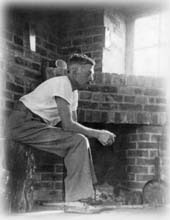 To begin with the family moved to a large house which Henry had bought in the village of Botesdale on the borders of Norfolk and Suffolk. This was only meant as an interlude, for the tensions of the farm years had done too much damage and it was already arranged that Henry and Loetitia would divorce as soon as suitable arrangements could be made. Whilst in Botesdale Henry became very friendly with the racing driver, St John Horsfall, who drove Aston Martin cars. Henry decided he too had to have an Aston Martin and bought a second-hand one. This car was to cause him endless trouble.
To begin with the family moved to a large house which Henry had bought in the village of Botesdale on the borders of Norfolk and Suffolk. This was only meant as an interlude, for the tensions of the farm years had done too much damage and it was already arranged that Henry and Loetitia would divorce as soon as suitable arrangements could be made. Whilst in Botesdale Henry became very friendly with the racing driver, St John Horsfall, who drove Aston Martin cars. Henry decided he too had to have an Aston Martin and bought a second-hand one. This car was to cause him endless trouble.
Soon after, in the late summer of 1946, Henry returned to Devon alone: divorce proceedings were instigated and the divorce became absolute in early 1947. Even during the dark and difficult days of the war Henry had often escaped to his writing hut at Ox’s Cross, and after the war was over he had made increasingly longer visits. He was at this time in love with yet another young lady in his constant search for the perfect ‘Barleybright’. Once again he suffered great anguish when this came to naught.
To begin with he stayed with friends in Georgeham village but after a while he went back to live permanently at the Field. Very soon he met a young teacher, Christine Duffield, with whom he fell almost immediately in love. They bought a caravan to live in at the Field and, after some initial difficulties over her mother’s disapproval, they were married in April 1949.
The honeymoon was once again the occasion of a visit, although brief this time, to the First World War battlefields in France, but the main destination was to visit another writer, Richard Aldington, who lived on the south coast of France and who was just beginning a biography on T. E. Lawrence (a book which was to cause great controversy in due course). Henry had also decided to visit his publishers in Italy and this meant crossing the Alps, driving his Aston Martin, which was proving to be an extremely difficult and uncomfortable car. Henry was not mechanically minded and could not cope with such temperamental cars, being of far too impatient a nature. The file of correspondence relating to his cars with the makers and various garages and mechanics reads like a French farce.
On their return to Devon, to begin with the couple lived a back-to-nature life in the Field, gardening, walking, with wood fires to warm them and water drawn from a well. The following year their son, Harry, was born. Henry decided to build a larger studio of solid construction in the Field but it was suggested that this was rather a bohemian life for a young child and so eventually a cottage was also bought in the nearby town of Ilfracombe – 4, Capstone Place – which gave the family a base. HW was once again able to use the Field as his escape to the peace and quiet necessary for him to write. The Field was always a very special place, a miniature nature reserve, with an extremely evocative atmosphere. But it was even more than that. For Henry it was almost a holy place, certainly a place of spiritual renewal and nourishment – a place where he could retire and enter his inner being, as a hermit goes on retreat to discover his soul.
